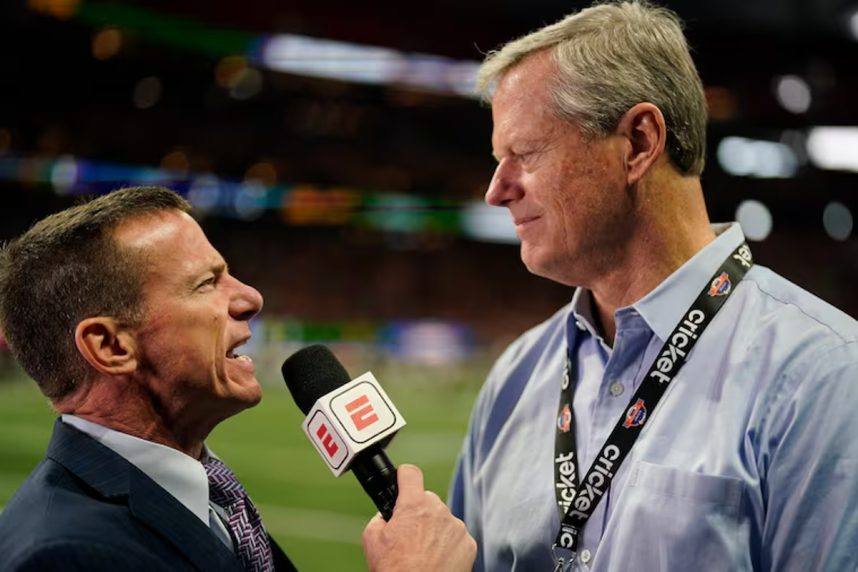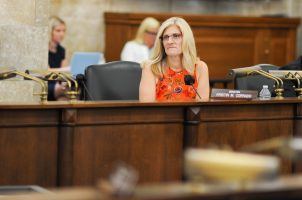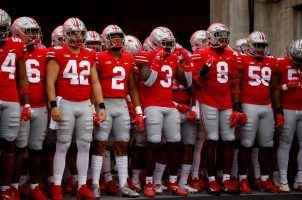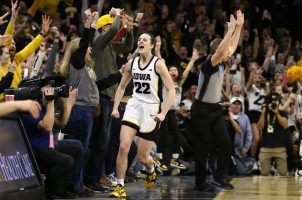NCAA President Charlie Baker Has Change of Heart Regarding Sports Betting
Posted on: June 12, 2024, 10:33h.
Last updated on: June 12, 2024, 10:39h.
NCAA President Charlie Baker signed Massachusetts’ sports betting bill into law when he was governor of the Bay State in August 2022. Less than two years later, along with a new job, Baker now regrets the vast expansion of legal sports gambling across the United States.

After fulfilling two four-year terms in Massachusetts, Baker was appointed the National Collegiate Athletic Association (NCAA) president in December 2022 and assumed the position in March 2023. Baker was initially supportive of college sports betting, as such gambling has been credited for increased television ratings, fan engagement and interest, and subsequent revenue for the governing body of college sports.
The NCAA leader, however, has repeatedly taken issue with legal, regulated sportsbooks offering player props involving student-athletes. Such wagers deal with an individual player’s performance.
Props Scorned by NCAA Boss
Baker believes props make players susceptible to harassment from unruly bettors and could jeopardize the integrity of the NCAA’s competitions. Speaking recently with Bryan Fischer of FOX Sports, Baker said the quick and vast expansion of legal sports gambling in the US might not have been in the best interests of college sports and student-athletes.
I wish sports betting had just stayed in Las Vegas,” Baker declared in rather surprising comments.
Before the US Supreme Court ruled in May 2018 that the Professional and Amateur Sports Protection Act of 1992 violated anticommandeering interpretations of the US Constitution, single-game sports betting was limited to Nevada. Other states like Delaware had parlay sports betting that required bettors to bet on multiple games through a single wager.
The landmark decision gave states the right to decide their laws on sports gambling. Six years later, 38 states, plus Washington, DC, have passed laws authorizing some form of sports betting. Thirty of those states and the nation’s capital allow online betting.
While many states have banned or amended their sports betting regulations to prohibit player props on college sports, the lines remain in several jurisdictions. It’s Baker’s most worrisome component of the ongoing expansion of the legal college sports gambling industry.
It all has to stop,” Baker declared. “So far, we’ve managed to work with four states to shut down prop betting on college sports.” Those states include Ohio, Maryland, Louisiana, and Vermont.
Player props on college athletes remain allowed in Connecticut, Illinois, Iowa, Maine, New Jersey, New Hampshire, and Rhode Island. The prop permissions in Connecticut, Illinois, and New Jersey don’t allow prop bets on college athletes playing for schools based in those states.
NCAA Settlement
Last month, the NCAA and the power conferences — the ACC, SEC, Big Ten, Big 12, and Pac-12 — announced a settlement that resolved three federal antitrust cases.
The agreement will allow schools to directly compensate their student-athletes with more than scholarship money. The NCAA will additionally pay former athletes nearly $2.8 billion in back damages.
Beginning in 2025, universities will be allowed to pay up to $20 million a year to college athletes. The governing body said the settlement is “a road map for college sports leaders” to “ensure this uniquely American institution can continue to provide unmatched opportunity for millions of students.”
Related News Articles
Ohio Gov. Mike DeWine Supports Ending College Player Prop Bets
Ohio Sports Betting Rules Amended To Prohibit College Player Props
Most Popular
FTC: Casino Resort Fees Must Be Included in Upfront Hotel Rates
Genovese Capo Sentenced for Illegal Gambling on Long Island
NBA Referees Expose Sports Betting Abuse Following Steve Kerr Meltdown
UPDATE: Former Resorts World & MGM Grand Prez Loses Gaming License
Most Commented
-
UPDATE: Whiskey Pete’s Casino Near Las Vegas Closes
— December 20, 2024 — 30 Comments -
Caesars Virginia in Danville Now Accepting Hotel Room Reservations
— November 27, 2024 — 9 Comments -
UPDATE: Former Resorts World & MGM Grand Prez Loses Gaming License
— December 19, 2024 — 8 Comments -
FTC: Casino Resort Fees Must Be Included in Upfront Hotel Rates
— December 17, 2024 — 7 Comments
















No comments yet